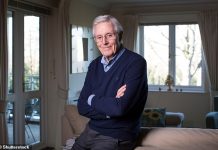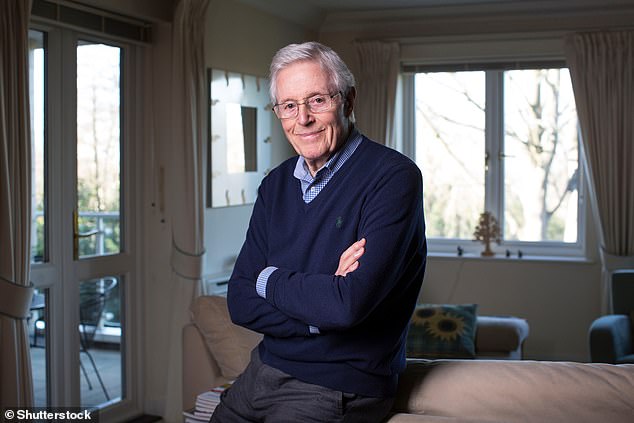Broadcasting legend Michael Aspel, 92, joined the BBC in 1957 and never looked back.
The former King’s Royal Rifle Corps conscript enjoyed a career at the Beeb and ITV that spanned more than five decades, writes Dan Moore.
He presented shows such as Aspel & Company, This Is Your Life and the Antiques Roadshow, and retired from the last of these in 2008.
In 2025 he appeared in an introductory feature for a BBC4 screening of The War Game. Aspel, who has fathered seven children, lives in Weybridge, Surrey, with his partner Irene.
What did your parents teach you about money?
The only lesson I learned from my father was to leave school as soon as possible and earn money. He wasn’t interested in anything else. My parents, Vi and Ted, never had a car, and they only ever rented accommodation. That was their philosophy.

Broadcasting legend: Michael joined the BBC in 1957 and never looked back, spending five decades on TV
What was your first job?
I did a paper round and contributed to the family coffers during the war.
I returned to London from evacuation in Somerset with £12, 6 shillings and 4 pence in a Post Office account aged 11. A short while later, I showed my business acumen when the shops stopped delivering papers and I charged each customer tuppence a week to deliver them.
Did you ever struggle to make ends meet?
No. My father’s attitude was get a job or get out, so I got a job as an office boy with William Collins, the publishers, on £7 a week. This was in 1949, when I was 16. It was good money.
National Service came to the rescue, and I stayed in the army until I was 18. That gave me time to think about what I wanted to do.
I decided I wanted to be an actor, writer or cartoonist, and I cast around for work. Needless to say, there was none, so I took a job at Myers, ‘makers of soft, comfortable beds’, which sent me to Cardiff to be a salesman.
There I joined an amateur theatre, which led to a BBC audition, and leaving Myers. This was in 1954, and I was being paid £10 a week to work for the Welsh Repertory Drama Company.
Why did you stop acting?
The producer asked if I’d like to apply for a job as a television announcer in London, as I wasn’t Welsh and they wanted Welsh speakers for the drama company. I passed that audition and found myself in the communal dinner jacket that swamped me, presenting serious programmes.
In 1960, BBC news presenter Richard Baker was ill and I stepped in. That resulted in me reading the news for eight years and taking the money, which improved with age.
Have you ever been paid silly money?
Along with many news readers and announcers, I worked on the side, providing commentaries for films, medical training videos, and industrial films, as well as introducing awards ceremonies on television.
The best paid, though, was a lunchtime gig that was not for telly. It was 40 or 50 years ago, and I can’t recollect who or what the ceremony was for. What I do recall is the £11,000 fee, just for introducing the winners.

Question time: Michael on one of his many shows, ITV’s Child’s Play
Were there interviews where you felt you’d really earned your money?
There was one occasion when [American actor]Tony Curtis came on Aspel & Company. He was always agreeable and gave you what you wanted, so we were toddling along and got on to his painting, which he did when not acting.
I said a silly thing: ‘So this is what’s made you the happy man you are today.’ He replied: ‘Who told you I was happy?’
I didn’t quite know what to say, but rather than respond with a line about him always seeming content, I said: ‘So, this is what’s made you the miserable man you are today.’ He walked off a few minutes later.
What was the best year of your career?
The busiest period, and therefore the most rewarding financially, would have been in the early 2000s when, for a spell, I was doing radio, Antiques Roadshow, and This Is Your Life.
I remember on one of my very first programmes, someone arrived with an Aviator watch and a repair bill made out to the owner, one TE Shaw of Clouds Hill, Dorset – also known as Lawrence of Arabia.
The man was stunned, not least as he thought Lawrence was a fictional character.
He’d bought it 20 years before for about £70 and went on to sell it for thousands.
What’s the most expensive thing you bought for fun?
When I moved near the River Wey, I thought it would be fun to buy a boat. So I picked up a cabin cruiser for £25,000.
It was a total disaster because the sum of my experience had been hiring boats on vast and tranquil Italian lakes during holidays, and here I was on a busy, major river.
It was a nightmare, so I sold the boat, Graziella, and gave the money to my son for university.
What was your biggest money mistake?
I was once approached by someone wanting to develop a new mathematics teaching aid, and I was asked to lend my voice to it. I thought it seemed like a nice, straightforward business, so I decided to invest some money.
The problem was that no schools showed any interest, and it ultimately failed. Coincidentally, I had just purchased a holiday cottage in Herefordshire, and I renovated it over 18 months. I ended up selling the cottage to cover the debt I had accumulated.
What’s been your best money decision?
My financial adviser in the 1990s recommended that I look at my annual income for the last two years and use that to decide what kind of income I’d need to achieve in retirement.
I followed this advice, and it has served me well, especially since I am hopeless with money and tend to overspend.
Do you own any property?
Irene and I own a lovely flat in Weybridge with a view of the water, as well as another flat in Brighton, along with other property interests for family members.
What is your number one financial priority?
I’m in the process of organising my finances to secure the future of my children, in particular, my disabled son, Patrick, who lives in a hospice.
- Michael Aspel supports the Princess Alice Hospice in Esher and the Sam Beare Hospice in Woking. Contact pah.org.uk and wsbh.org.uk for more information and to donate.
#boat #disaster #River #Wey #Italian #lakes #MICHAEL #ASPEL
















